If you’ve heard about the Project Management Professional (PMP) certification in your circles but are unsure what it is or how to get it, you’re in the right place. In this “what is PMP certification” guide, we’ll tell you what the PMP is, how you can benefit from it if you use agile and hybrid project management methodologies, how you can obtain it and how much it will cost.
So, if you’re a project manager who’s ready to add to your project management certifications, increase your project management skills and enhance your earning potential, sit back, relax and learn what PMP training and certification can do for you.
What Is PMP Certification?
The PMP certificate, which is for experienced project managers, is globally recognized as a project management certification that proves an individual has the skills and knowledge to lead projects and the teams that drive projects forward. According to PMI, more than 1.4 million project managers working in various industries have obtained the certification.
What Are the Benefits of Getting a Project Management Professional Certification?
Continuing education always comes with many benefits. Below, we quickly cover how holding the Professional Project Management certification can benefit you and further your career.
- Recognition: The PMP certification will show that you have the expertise to lead projects and have the specialized knowledge necessary to manage diverse, agile teams that use hybrid approaches and methodologies.
- Increased confidence: The PMP certification will increase a project manager’s confidence. A project leader will know that they have the ability to lead any project successfully.
- Higher earning potential: According to the PMI, a project manager with the PMP certification can earn as much as 32% more in the U.S. and 16% more globally than those without the certificate.1 Per Zip Recruiter, the average median salary is nearly $60 per hour, while some outliers earn more than $80 per hour.2
- Better opportunities: Project managers with the PMP certification will likely be eligible to apply for more jobs than those without. According to the PMI, 25 million project management specialists will be necessary to meet the demand by 2030 as 13 million professionals retire, and 12 million more certified project managers will be required to meet expansion demands.3
Required Education
The Project Management Institute stipulates that all applications meet strict PMP certification requirements. We cover the education requirements below.
- Education: A four-year college (bachelor’s degree) or university degree or a high school diploma or secondary education certificate.
- Project management education: You will need 35 hours of project management education or will need to obtain the Certified Associate in Project Management (CAPM) certification.
Required Professional Experience
The PMP project management certification exam has two sets of project management experience requirements that differ based on your educational background. We list the requirements below.
- With a college or university degree: You must have 36 months of experience leading projects during the last eight years if you have a four-year degree or university degree.
- With a high school or secondary education certificate: You must have 60 months of experience in project management from the previous eight years if you have a high school diploma or secondary education certificate.
How Much Does the PMP Exam Cost?
The PMP exam costs $405 for Project Management Institute members and $575 for non-members. PMI membership costs $149 per year, so even with the membership fee tacked on, the total exam fee is still cheaper for PMI members, though only slightly.
What’s on the PMP Exam?
Whether you take a preparatory course or self-study, you’ll need to be ready for the PMP exam content. We list the three main exam categories and what they cover below.
- People — 42% of the exam: This portion of the exam covers conflict resolution, team leadership, team performance, team building, removing obstacles and negotiation tactics. Other areas include supporting virtual teams, mentoring stakeholders, defining ground rules and using emotional intelligence to boost performance.
- Process — 50% of the exam: The process portion covers executing urgent projects, communication management, risk management, stakeholder engagement, planning and managing budgets and resources, and quality of deliverables. Other areas include project scopes, procurement, establishing structures and more.
- Business environment — 8% of the exam: The business section accounts for just 8% of the PMP exam and covers managing project compliance, delivering project value and benefits, how business environment changes affect project scopes and support for organizational change.
To pass the exam, you’ll need to use your knowledge of project management and remember what you learned from the CAPM course or the PMP preparatory course (if you took it). You’ll also need to use the knowledge you learned from study materials like the PMI’s Project Management Book of Knowledge (PMBOK).
How to Get the PMP Certification
To earn the Project Management Professional certification, you must meet the educational and professional experience requirements and pass the PMP exam.
Overall, the process is reasonably straightforward. You must prove you have the required experience, show your degrees or diplomas, study, apply for the exam, take the exam and then renew your certificate every three years. We’ll break down these steps a little further so you can learn more about them and how to get the PMP certification from the PMI.
- Meet the PMP Work Requirements
Before applying for the PMP exam, you must meet the minimum work requirements. Applicants with a college or university degree need 36 months of project management (PM) experience from the previous eight years, and those with a high school or secondary education diploma need 60 hours of PM experience from the previous eight years.
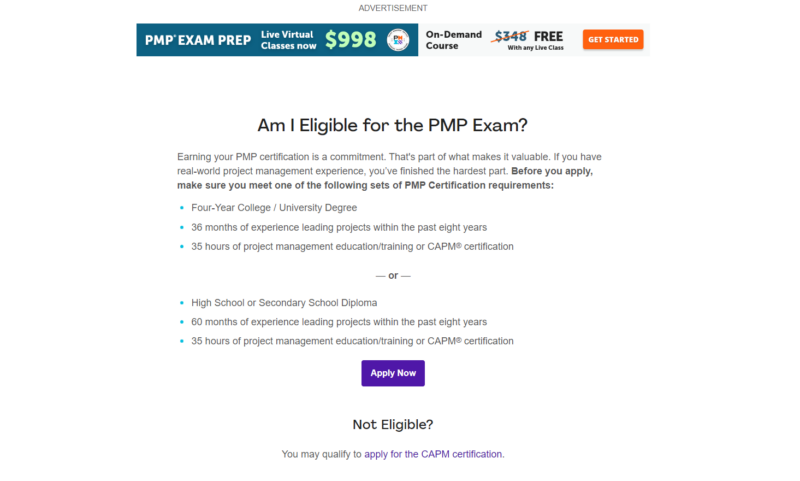
- Meet the PMP Education Requirements
The PMI requires that you meet certain education qualifications. You must have either a four-year college or university degree or a high school diploma or certificate of secondary education. You must also have 35 hours of project management education or hold the Certified Associate of Project Management (CAPM) certification.
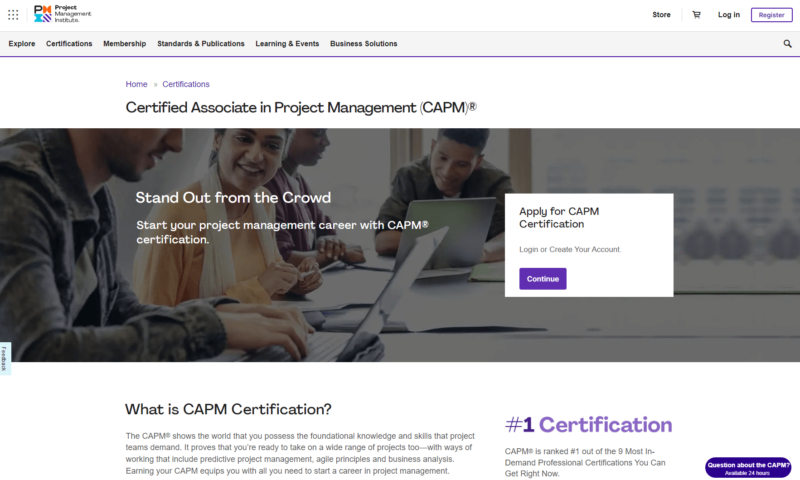
- Study for the PMP Exam
The Project Management Institute recommends taking a PMP prep course before the exam, though this is not required. If you don’t want to take on the extra expense, you can self-study using the Project Management Book of Knowledge (PMBOK) and by taking a practice exam, which costs $99 and is not required.
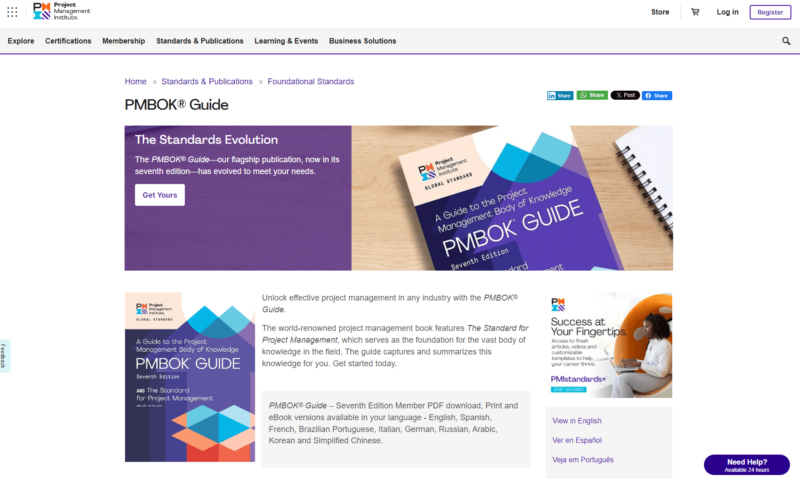
- Apply For The Exam
When you feel confident, you can apply for the exam by visiting the PMI PMP webpage. You must decide whether you want to become a PMI member. If you do, you can save money on the exam ($405 for members). However, you can proceed without becoming a member; you’ll just have to pay more for the examination ($575 for non-members).
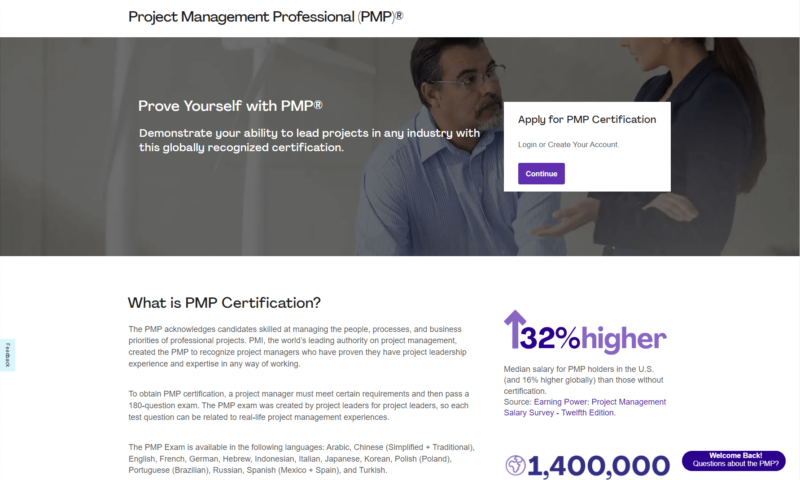
- Take the Project Management Professional Exam
After meeting the minimum professional and educational requirements and paying the fees, you can sit for the exam. It is 230 minutes long and has 180 questions (five of which are pretest questions). There are two 10-minute breaks during the exam. Each section is weighted differently, so there is no set passing grade.
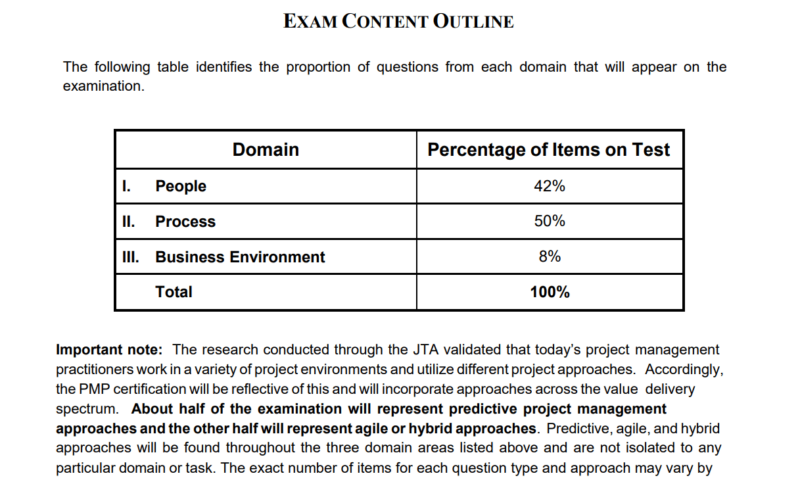
- Renew Your PMP Certificate
Once you have secured your PMP certification, you’ll need to renew it every three years. To be eligible for renewal, you must have earned 60 Professional Development Units (PDUs) through continuing education. You must also pay the renewal fee, which is $60 for PMI members and $150 for non-members.
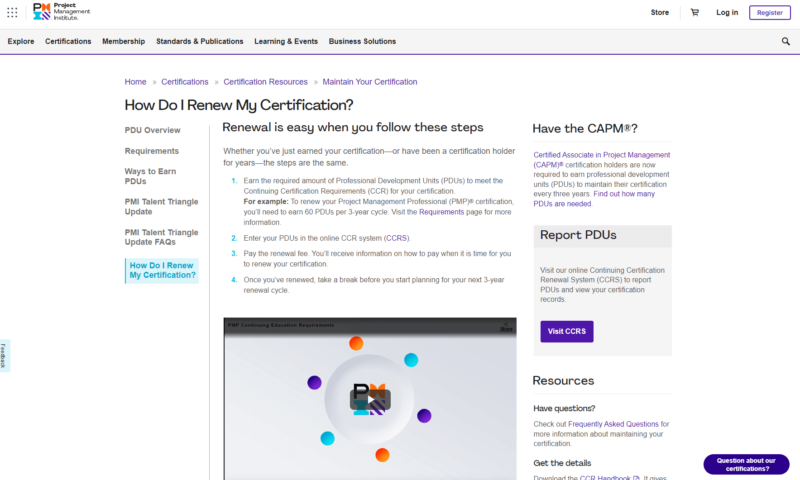
{“@context”:”https:\/\/schema.org”,”@type”:”HowTo”,”name”:”How to Get the PMP Certification”,”description”:”These step-by-step instructions show how to get a PMP Certification.”,”totalTime”:”P00D02M00S”,”supply”:0,”tool”:0,”url”:”https:\/\/www.cloudwards.net\/what-is-pmp-certification\/#how-to-get-the-pmp-certification”,”image”:{“@type”:”ImageObject”,”inLanguage”:”en-US”,”url”:”https:\/\/www.cloudwards.net\/wp-content\/uploads\/2024\/02\/What-Is-PMP-Certification.png”},”step”:[{“@type”:”HowToStep”,”name”:”Meet the PMP Work Requirements”,”position”:1,”url”:”https:\/\/www.cloudwards.net\/what-is-pmp-certification\/#meet-the-pmp-work-requirements”,”itemListElement”:{“@type”:”HowToDirection”,”text”:”Before applying for the PMP exam, you must meet the minimum work requirements. Applicants with a college or university degree need 36 months of project management (PM) experience from the previous eight years, and those with a high school or secondary education diploma need 60 hours of PM experience from the previous eight years.\n”},”image”:{“@type”:”ImageObject”,”inLanguage”:”en-US”,”url”:”https:\/\/www.cloudwards.net\/wp-content\/uploads\/2024\/02\/pmp-requirements.png”}},{“@type”:”HowToStep”,”name”:”Meet the PMP Education Requirements”,”position”:2,”url”:”https:\/\/www.cloudwards.net\/what-is-pmp-certification\/#meet-the-pmp-education-requirements”,”itemListElement”:{“@type”:”HowToDirection”,”text”:”The PMI requires that you meet certain education qualifications. You must have either a four-year college or university degree or a high school diploma or certificate of secondary education. You must also have 35 hours of project management education or hold the Certified Associate of Project Management (CAPM) certification.\n”},”image”:{“@type”:”ImageObject”,”inLanguage”:”en-US”,”url”:”https:\/\/www.cloudwards.net\/wp-content\/uploads\/2024\/02\/capm.png”}},{“@type”:”HowToStep”,”name”:”Study for the PMP Exam”,”position”:3,”url”:”https:\/\/www.cloudwards.net\/what-is-pmp-certification\/#study-for-the-pmp-exam”,”itemListElement”:{“@type”:”HowToDirection”,”text”:”The Project Management Institute recommends taking a PMP prep course before the exam, though this is not required. If you don\u2019t want to take on the extra expense, you can self-study using the Project Management Book of Knowledge (PMBOK) and by taking a practice exam, which costs $99 and is not required.\n”},”image”:{“@type”:”ImageObject”,”inLanguage”:”en-US”,”url”:”https:\/\/www.cloudwards.net\/wp-content\/uploads\/2024\/02\/pmbok-guide.png”}},{“@type”:”HowToStep”,”name”:”Apply For The Exam”,”position”:4,”url”:”https:\/\/www.cloudwards.net\/what-is-pmp-certification\/#apply-for-the-exam”,”itemListElement”:{“@type”:”HowToDirection”,”text”:”When you feel confident, you can apply for the exam by visiting the PMI PMP webpage. You must decide whether you want to become a PMI member. If you do, you can save money on the exam ($405 for members). However, you can proceed without becoming a member; you\u2019ll just have to pay more for the examination ($575 for non-members).\n”},”image”:{“@type”:”ImageObject”,”inLanguage”:”en-US”,”url”:”https:\/\/www.cloudwards.net\/wp-content\/uploads\/2024\/02\/pmp-application.png”}},{“@type”:”HowToStep”,”name”:”Take the Project Management Professional Exam”,”position”:5,”url”:”https:\/\/www.cloudwards.net\/what-is-pmp-certification\/#take-the-project-management-professional-exam”,”itemListElement”:{“@type”:”HowToDirection”,”text”:”After meeting the minimum professional and educational requirements and paying the fees, you can sit for the exam. It is 230 minutes long and has 180 questions (five of which are pretest questions). There are two 10-minute breaks during the exam. Each section is weighted differently, so there is no set passing grade.\n”},”image”:{“@type”:”ImageObject”,”inLanguage”:”en-US”,”url”:”https:\/\/www.cloudwards.net\/wp-content\/uploads\/2024\/02\/pmp-exam-categories.png”}},{“@type”:”HowToStep”,”name”:”Renew Your PMP Certificate”,”position”:6,”url”:”https:\/\/www.cloudwards.net\/what-is-pmp-certification\/#renew-your-pmp-certificate”,”itemListElement”:{“@type”:”HowToDirection”,”text”:”Once you have secured your PMP certification, you\u2019ll need to renew it every three years. To be eligible for renewal, you must have earned 60 Professional Development Units (PDUs) through continuing education. You must also pay the renewal fee, which is $60 for PMI members and $150 for non-members.\n”},”image”:{“@type”:”ImageObject”,”inLanguage”:”en-US”,”url”:”https:\/\/www.cloudwards.net\/wp-content\/uploads\/2024\/02\/renew-certification.png”}}]}
Final Thoughts
Passing the PMP certification exam can help you get ahead in the competitive project management field. Obtaining the certification will give you recognition, prove your skills, enhance your earning potential and open up many job opportunities. If you’re ready to advance your career, passing the PMP certification exam is a great way to do so.
What do you think about our PMP certification guide? Did you find it helpful? Do you already hold the certification? If so, how has it helped propel your career? Let us know in the comments, and as always, thanks for reading.
FAQ: PMP Certification
-
The PMP certification shows potential employers that you have the experience, skills and knowledge to lead simple and complex projects and teams in many industries.
-
The PMP exam is challenging. Though there is no passing grade (due to each exam segment being weighted differently), you’ll still need to answer a significant number of the 180 questions correctly to pass.
-
Yes. The project management industry is competitive. By completing project management training and obtaining the PMP, you’ll gain recognition, improve your job prospects and grow your earning potential.
-
Yes. Holding the PMP certification will show that you’re an experienced project manager with the knowledge and skills to lead projects.
{“@context”:”https:\/\/schema.org”,”@type”:”FAQPage”,”mainEntity”:[{“@type”:”Question”,”name”:”What Does the PMP Certification Do?”,”acceptedAnswer”:{“@type”:”Answer”,”text”:”
The PMP certification shows potential employers that you have the experience, skills and knowledge to lead simple and complex projects and teams in many industries.\n”}},{“@type”:”Question”,”name”:”Is the PMP Exam Hard?”,”acceptedAnswer”:{“@type”:”Answer”,”text”:”
The PMP exam is challenging. Though there is no passing grade (due to each exam segment being weighted differently), you\u2019ll still need to answer a significant number of the 180 questions correctly to pass.\n”}},{“@type”:”Question”,”name”:”Is It Worth Getting the PMP?”,”acceptedAnswer”:{“@type”:”Answer”,”text”:”
Yes. The project management industry is competitive. By completing project management training and obtaining the PMP, you\u2019ll gain recognition, improve your job prospects and grow your earning potential.\n”}},{“@type”:”Question”,”name”:”Does PMP Certification Help Land a Job?”,”acceptedAnswer”:{“@type”:”Answer”,”text”:”
Yes. Holding the PMP certification will show that you\u2019re an experienced project manager with the knowledge and skills to lead projects.\n”}}]}
Sources:
- https://www.pmi.org/certifications/project-management-pmp
- https://www.ziprecruiter.com/Salaries/Pmp-Project-Manager-Salary
- https://www.pmi.org/certifications/project-management-pmp
The post What Is PMP Certification, What Is It for & How Can You Get It in 2024? appeared first on Cloudwards.

